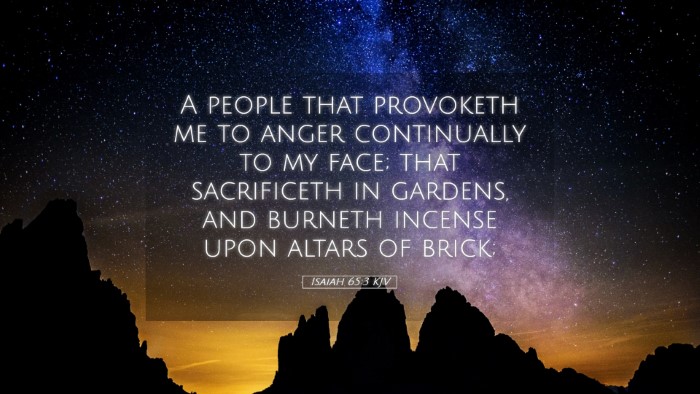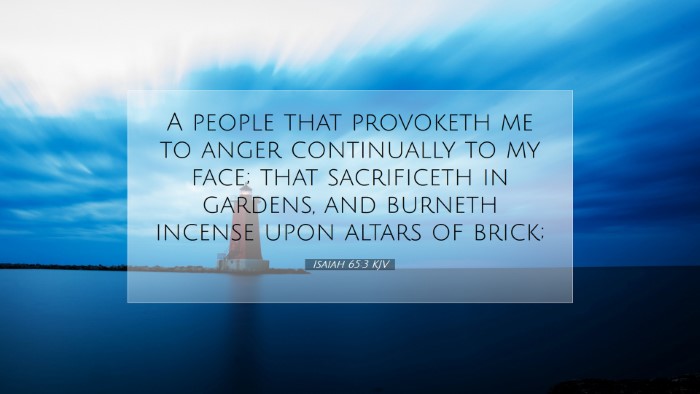Commentary on Isaiah 65:3
Isaiah 65:3 states:
"A people that provoketh me to anger continually to my face; that sacrificeth in gardens, and burneth incense upon altars of brick."
This verse is part of a profound section in the Book of Isaiah where the prophet contrasts the judgment of God with the promise of redemption. Here, we draw insights from key public domain commentaries to analyze and elucidate the themes presented in this verse.
Overview of the Context
Isaiah, a revered prophet, speaks of Israel's rebellion against God. This portion of scripture encapsulates a divine lament over Israel's persistent disobedience, indicating a refusal to adhere to God's commandments. The 'people' referred to in this passage embody a disobedient generation, yet the commentary reflects on the broader theological implications of their actions.
Insights from Matthew Henry
Matthew Henry, in his commentary, outlines the context of this verse through the lens of God's holiness and the people's transgressions. He notes that:
- Provoke to Anger: The imagery of provoking God “face to face” highlights the audacity of the Israelites. Their open defiance demonstrates a lack of reverence toward the Almighty, much like a child openly disobeying a parent.
- Sacrifices in Gardens: Henry emphasizes the nature of their offerings. By sacrificing in private gardens rather than the designated temple, they acted in rebellion against God's ordained worship practices. This signifies their attempt to pursue idolatry while neglecting true worship.
- Incense upon Altars of Brick: The reference to 'altars of brick' suggests a return to material, man-made forms of worship, contrasting with the divinely prescribed orders. This symbolizes the human tendency toward self-made religions that deviate from God's intent.
Insights from Albert Barnes
Albert Barnes provides a thorough analysis of the consequences of Israel's actions and God's response. He comments on several key aspects:
- Continual Provocation: Barnes stresses that the phrase “continually to my face” indicates a persistent and blatant rebellion, suggesting that the people are fully aware of their disobedience. This emphasizes the severity of their sins against a holy God.
- Gardens and Altars: He points out that the 'gardens' are symbolic of personal and unauthorized worship. The people prefer a worship that is convenient and self-defined, deviating from God’s established order which leads to their spiritual decay.
- Divine Displeasure: Barnes highlights that God's displeasure comes not from the act of offering itself but from the fact that these offerings were given in defiance of the covenant relationship God sought with His people.
Insights from Adam Clarke
Adam Clarke's commentary dives deep into the actions described in the verse, analyzing the implications for the people of Israel:
- Rejecting God’s Ways: Clarke emphasizes that the Israelites' choice to engage in worship practices outside of God’s commandments led to a spiritual crisis. Their sacrifices become hollow offerings lacking true devotion.
- Symbolism of Brick Altars: The altars of brick represent a stark shift from the living and true God to lifeless traditions and acts. This highlights the dangers of creating a semblance of worship that lacks a foundational relationship with God.
- Call to Repentance: Clarke interprets this verse as a call to the people to recognize their wrongful practices and return to the true worship of God—an imperative that resonates through the ages for believers today.
Theological Implications
The analysis of Isaiah 65:3 bears significant theological implications for contemporary readers:
- God's Holiness: This verse underscores the holiness of God and His intolerance for rebellion. Understanding God's nature helps believers appreciate the gravity of disobedience.
- Worship Practices: The plight of Israel serves as a warning against integrating secular practices into sacred worship. It invites reflection on the authenticity and motivation behind our worship today.
- Divine Judgment: It brings forth a sobering reminder of the consequences of turning away from God's directives, urging the faithful to engage in self-examination and seek genuine repentance.
Conclusion
Isaiah 65:3 provides a penetrating insight into the relationship between God and His people through the lens of rebellion and false worship. The combined wisdom of the commentaries from Matthew Henry, Albert Barnes, and Adam Clarke enlightens the contemporary understanding of these themes, serving as a guide for pastors, students, and theologians. The verse beckons a deep reconsideration of how modern believers engage with God in worship, the importance of adhering to scriptural truth, and the necessity of maintaining a relationship founded on reverence and obedience.


